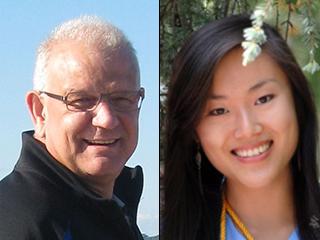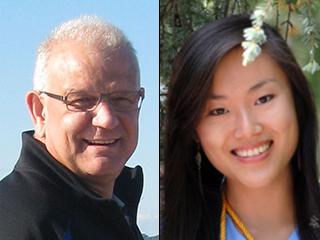
Credit: Baylor College of Medicine
Researchers have discovered that impairing a critical partnership between brain cells can lead to neurodegeneration. The study published in Cell Metabolism reports a mechanism by which two types of brain cells, neurons and glia, normally support each other's functions. The researchers discovered that when this mechanism fails, neurodegeneration follows, opening a path to a better understanding of disorders such as Alzheimer's disease.
"Using fruit flies, we are able to thoroughly study the functions of proteins that are shared between flies and humans. Often, perturbation of these proteins leads to neurodegenerative characteristics in flies and neurodegenerative diseases in people. By studying how these genes cause defects in fly and mouse models, we can improve our insights into the mechanisms related to human disease," said corresponding author and Dr. Hugo J. Bellen, professor of neuroscience and molecular and human genetics at Baylor College of Medicine and an investigator at the Howard Hughes Medical Institute.
First author Dr. Lucy Liu, a Ph.D. graduate in neuroscience from the Bellen lab, discovered in 2015 that a number of genes involved in neurodegeneration promote damage to neurons and glia by inducing high levels of free radicals (oxidative stress) and accumulation of lipid droplets in glia. This work sets the stage for the current study.
"Using electron microscopy, we observed lipid droplet accumulation in glia before obvious symptoms of neurodegeneration," Liu said. "In the presence of high levels of oxidative stress, neurons produce an overabundance of lipids. The combination of free radicals and lipids, which produces peroxidated lipids, is detrimental to cellular health. Neurons try to avoid this damage by secreting these lipids, and apolipoproteins – proteins that transport lipids – carry them to glia cells. Glia store the lipids in lipid droplets, sequestering them from the environment and providing a protective mechanism."
Liu and her colleagues discovered that the storage of lipid droplets in glia protects neurons from damage as long as the free radicals do not destroy the lipid droplets. When the lipid droplets are destroyed, cell damage and neurodegeneration ensues.
Connection to Alzheimer's disease
"Our research brought us to a fascinating and unexpected finding," Liu said. "Approximately 15 percent of the human population carries apolipoprotein APOE4. Since APOE4 was first linked to Alzheimer's disease almost 30 years ago, it remains the strongest known genetic risk factor for this disease. Meanwhile, APOE2, which is slightly different from APOE4, is protective against the disease. This evidence suggests that APOE is important for proper brain function, but we know little about how APOE itself may lead to Alzheimer's disease".
The researchers found that apolipoproteins APOE2, APOE3 and APOE4 have different abilities to transfer lipids from neurons to glia and hence differ in their ability to mediate the accumulation of lipid droplets.
"APOE2 and APOE3 can effectively transfer lipids into glia," Liu said. "On the other hand, APOE4 is practically unable to carry out this process. This results in a lack of lipid droplet accumulation in glia and breakdown of the protective mechanism that sequesters peroxidated lipids. This fundamental difference in the function in APOE4 likely primes an individual to be more susceptible to the damaging effects of oxidative stress, which becomes elevated with age."
"Another contribution of this study is that glia play an important protective role against oxidative stress in neurodegeneration," Bellen said. "Mutations that lead to a breakdown of this support system between neurons and glia can pave the way to neurodegeneration and it seems that free radicals are at the root of a key aspect of this process."
###
Other contributors to this work include Kevin R. MacKenzie, Nagireddy Putluri and Mirjana Maleti-Savati. The authors are affiliated with one or more of the following institutions, Baylor College of Medicine, the Jan and Dan Duncan Neurological Research Institute at Texas Children's Hospital and the Howard Hughes Medical Institute.
This project was supported by the National Institutes of Health (NIH) R01GM120033-01 and 5R01GM067858, the Robert A. and Renee E. Belfer Family Foundation, the Huffington Foundation and Target ALS, the Dan L. Duncan Comprehensive Cancer Center, the neuroscience graduate program training grant (5T32GM008507-18) from 2011 to 2012 and the Rush and Helen Record Fellowship in 2016. Support was provided to the BCM Cell Sorting core via the NIH (P30 AI036211, P30 CA125123, and S10 RR024574) and to the Metabolomics Core at BCM with funding from the NIH (P30 CA125123) and CPRIT (RP120092).
Media Contact
Graciela Gutierrez
[email protected]
713-798-4710
@bcmhouston
https://www.bcm.edu/news
Original Source
https://www.bcm.edu/news/brain/breakdown-brain-cell-collaboration-alzheimers http://dx.doi.org/10.1016/j.cmet.2017.08.024





